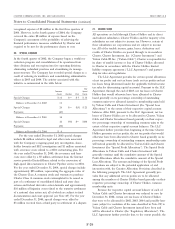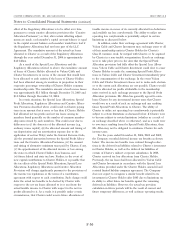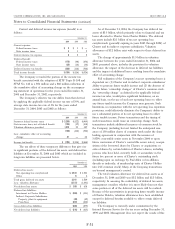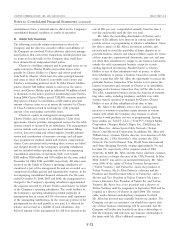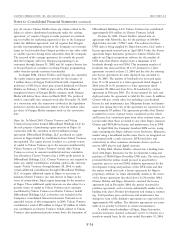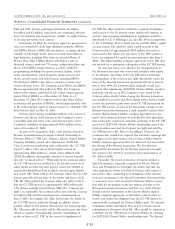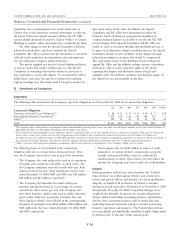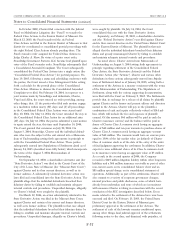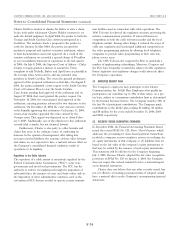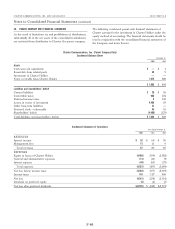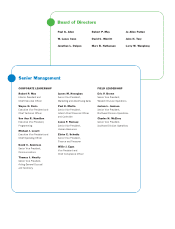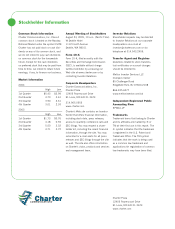Charter 2004 Annual Report Download - page 147
Download and view the complete annual report
Please find page 147 of the 2004 Charter annual report below. You can navigate through the pages in the report by either clicking on the pages listed below, or by using the keyword search tool below to find specific information within the annual report.
CHARTER COMMUNICATIONS, INC. AND SUBSIDIARIES 2004 FORM 10-K
Notes to Consolidated Financial Statements (continued)
Charter Holdco’s motion to dismiss for failure to state a claim. sion facilities used in connection with cable operations. The
It also took under advisement Charter Holdco’s motion to set 1996 Telecom Act altered the regulatory structure governing the
aside the default judgment. In April 2004, the parties to both the nation’s communications providers. It removed barriers to
Georgia and South Carolina Class Actions participated in a competition in both the cable television market and the local
mediation. The mediator made a proposal to the parties to telephone market. Among other things, it reduced the scope of
settle the lawsuits. In May 2004, the parties accepted the cable rate regulation and encouraged additional competition in
mediator’s proposal and reached a tentative settlement, subject the video programming industry by allowing local telephone
to final documentation and court approval. As a result of the companies to provide video programming in their own tele-
tentative settlement, we recorded a special charge of $9 million phone service areas.
in our consolidated statement of operations in the first quarter The 1996 Telecom Act required the FCC to undertake a
of 2004. On July 8, 2004, the Superior Court of Athens — Clarke number of implementing rulemakings. Moreover, Congress and
County, Georgia granted a motion to amend the Tobar the FCC have frequently revisited the subject of cable regulation.
complaint to add Nicholls, Barber and April Jones as plaintiffs in Future legislative and regulatory changes could adversely affect
the Georgia Class Action and to add any potential class the Company’s operations.
members in South Carolina. The court also granted preliminary
24. EMPLOYEE BENEFIT PLAN
approval of the proposed settlement on that date. On August 2,
2004, the parties submitted a joint request to the South Carolina The Company’s employees may participate in the Charter
Court of Common Pleas to stay the South Carolina Communications, Inc. 401(k) Plan. Employees that qualify for
Class Action pending final approval of the settlement and on participation can contribute up to 50% of their salary, on a pre-
August 17, 2004, that court granted the parties’ request. On tax basis, subject to a maximum contribution limit as determined
November 10, 2004, the court granted final approval of the by the Internal Revenue Service. The Company matches 50% of
settlement, rejecting positions advanced by two objectors to the the first 5% of participant contributions. The Company made
settlement. On December 13, 2004 the court entered a written contributions to the 401(k) plan totaling $7 million, $7 million
order formally approving that settlement. On January 11, 2005, and $8 million for the years ended December 31, 2004, 2003
certain class members appealed the order entered by the and 2002, respectively.
Georgia court. That appeal was dismissed on or about Febru-
ary 3, 2005. Additionally, one of the objectors to this settlement 25. RECENTLY ISSUED ACCOUNTING STANDARDS
recently filed a similar, but not identical, lawsuit. In December 2004, the Financial Accounting Standards Board
Furthermore, Charter is also party to, other lawsuits and issued the revised SFAS No. 123, Share — Based Payment, which
claims that arose in the ordinary course of conducting its addresses the accounting for share-based payment transactions
business. In the opinion of management, after taking into in which a company receives employee services in exchange for
account recorded liabilities, the outcome of these other lawsuits (a) equity instruments of that company or (b) liabilities that are
and claims are not expected to have a material adverse effect on based on the fair value of the company’s equity instruments or
the Company’s consolidated financial condition, results of that may be settled by the issuance of such equity instruments.
operations or its liquidity. This statement will be effective for the Company beginning
July 1, 2005. Because Charter adopted the fair value recognition
Regulation in the Cable Industry
provisions of SFAS No. 123 on January 1, 2003, the Company
The operation of a cable system is extensively regulated by the
does not expect this revised standard to have a material impact
Federal Communications Commission (‘‘FCC’’), some state
on its financial statements.
governments and most local governments. The FCC has the
Charter does not believe that any other recently issued, but
authority to enforce its regulations through the imposition of
not yet effective accounting pronouncements, if adopted, would
substantial fines, the issuance of cease and desist orders and/or
have a material effect on the Company’s accompanying financial
the imposition of other administrative sanctions, such as the
statements.
revocation of FCC licenses needed to operate certain transmis-
F-39


